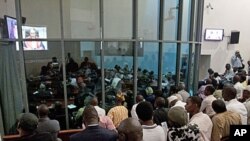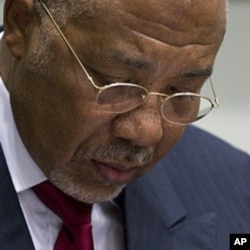Key Dates in Charles Taylor's Life
- 1983: Flees Liberia after being accused of embezzling government funds
- 1985: Escapes from a U.S. jail after one year in prison
- 1989: Resurfaces in Liberia, launches rebellion
- 1991: RUF rebels attack villages in Sierra Leone from Liberia.
- 1997: Elected president of Liberia
- 2003: Special Court for Sierra Leone indicts Taylor on initial charges, months later he steps down as president and takes asylum in Nigeria.
- 2006: Arrested in Nigeria and sent to The Hague for trial
- 2007: War crimes trial opens in The Hague.
- 2012: Convicted of aiding and abetting war crimes
Former Liberian President Charles Taylor was found guilty Thursday of aiding and abetting grave human rights abuses and war crimes in a historic verdict by the Special Court for Sierra Leone. While Taylor was not found guilty of masterminding the atrocities, he became the first former African head of state to be convicted in an international court. In Taylor's native Liberia and in Sierra Leone, where the crimes were committed, interest in the verdict was very high.
Liberians gathered around radios and televisions or watched online, using slow connections at internet cafes, as former President Charles Taylor was convicted of involvement in war crimes and crimes against humanity in Sierra Leone.
From the site of the trial in The Hague, the Special Court for Sierra Leone said Taylor was not guilty of committing the crimes himself. However, he was guilty of aiding and abetting rebels as they terrorized civilians, carved their initials into the bodies of child soldiers and carried out murder, abductions and rape.
The court said prosecutors had not proven beyond reasonable doubt that Taylor was part of the rebel's command structure.
In Sierra Leone, people watched television as the judge's verdict was dubbed into Sierra Leonean krio. But if people applauded the verdict in Sierra Leone, it was met with mixed emotions in Taylor's native Liberia, where he still has some support.
Jewel Howard Taylor, a Liberian senator, was Taylor's first wife. She maintains that her ex-husband was not responsible for the crimes.
"I can only speak for what I saw and I did not see any connection," she said. "But I don't think he should be held responsible. I still don't see the connection of how he could be held responsible for those things done in Sierra Leone when they were actually done by Sierra Leonean armed forces."
Gabriel Morris, 45, said justice will only be done when Liberia can make its own decisions and handle its own prosecution cases.
"It's not handled by Liberia, so what can we do? We can't do anything? Whatever they say is what the Liberians will agree to. If they say Taylor is guilty, there's nothing we can do. For me, it's a conspiracy," said Morris.
Judge Richard Lussick said Taylor hid behind his reputation as a broker of peace in Liberia and Sierra Leone, publicly participating in efforts to promote peace, while secretly funding hostilities between the government and the rebels.
The judges found that he urged the rebels not to disarm, even during an arms embargo implemented by regional bloc ECOWAS.
Thursday was declared a public holiday in Liberia in order to prevent a public reaction to the verdict. Offices were closed, U.N. troops were deployed to the streets and citizens were urged to remain calm.
Schoolteacher Jerry Brooks said Taylor was far from a model Liberian leader.
"I'm not surprised," he said. "He should bear the consequences. You can't be a leader, and be arrogant. You can't be a leader, and wage your war on another suffering nation. You can't be a leader, suppressing other people."
As the verdict was read out, a rainbow was seen in the sky, encircling the sun. For many Liberians, superstition is a part of life. The rainbow heralded a new era, they said, beginning with the verdict of Taylor.
Liberian Tamba Cole said he welcomed the guilty verdict. He said Taylor has now set an example to other leaders in Africa, and around the world. Such crimes will no longer be tolerated by the international community, he said.
"The coming leaders in Africa will have to be very careful. He is Liberian, but the actions he took make him to be guilty. He set an example for other people. Then, next time, it will not happen," said Cole.
The prosecution and the defense teams have seven days to appeal Thursday's verdict. Taylor will be sentenced during a series of hearings in May.
Photo gallery by VOA French to Africa’s Nathalie Barge of photos taken in Sierra Leone and Guinea between May, 2000 and January, 2002.
In an earlier version of this story, we incorrectly reported that the trial of former Liberian President Charles Taylor cost the Special Court for Sierra Leone $250 million. VOA regrets the error.





